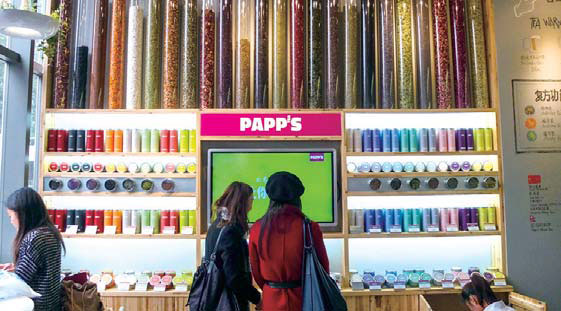Helping tea to turn over a new leaf
A man from Colorado showing Chinese how to drink tea is akin to a man from Chongqing showing people in the United States how to eat apple pie, but that does not seem to be putting off Martin Papp.
The 30-year-old, who has lived in China for seven years, has given himself the mission of reinventing tea and cultivating a new culture of tea drinking.
He runs Papp's Tea Lab and Papp's Tea Lounge in Beijing, both of which eschew the genteel decor of most teahouses and instead emphasize the modern and fashionable in venues that target young adults.
|
Martin Papp's tea lounge in Beijing. He says it is his mission to reinventing tea and cultivating a new culture of tea drinking. Provided to China Daily |
"Tea does not have to be something that's old, traditional, and your parents' drink," Papp says. His philosophy is to make tea drinking fun and trendy.
Papp says that one problem with teahouses in China is that their prices are anything but transparent. There is a lack of standardization in the industry and a lot of teas are overpriced, he says.
"When I go to a teahouse in China, I don't know how much money I am going to spend. In a teahouse, it's sometimes 80 yuan ($12; 11 euros) for a pot and it's sometimes 800 yuan for a pot, and even if you spend a lot of money, you don't know whether the tea warrants it or not.
"Young people are not going to teahouses anymore. That's what I want to change, to create a quality, international, modern tea brand in China."
Papp's Tea Lab is a versatile space where Papp and his team research and develop tea products, do training and host events, and Papp's Tea Lounge is more relaxed, for customers.
The menu includes not only some of the best Chinese teas including Pu'er dark tea, Dragon Well green tea, and Phoenix oolong tea, but also a collection of high-quality world teas including rooibos from South Africa, chamomile from Croatia and black tea from Nepal. You pay for a cup of tea about what you'd pay for a cup of tea or coffee at Starbucks.
Papp says that if tea is to be for the young and to be modern, it needs to be international. Another critical problem Papp sees in China's tea industry is a lack of education.
"If you look at Chinese websites about tea there is much mixed, scattered and different information," Papp says in fluent Chinese. "We take in and organize all this information and put it in a simple and easy way that anyone can understand."
Recently, Papp has changed his business model. His aim used to be to create tea products and give tea drinking a cafe-esque ambience.
Now his focus is on creating tea, making blends, sourcing tea from around the world, and providing tea education and tea classes.
"I would say about 90 percent of all the tea blends you see from the West are flavored," Papp says. "Any fruit tea you've ever tried is probably flavored."
Papp's Tea does not add any type of man-made flavoring to blends, and all authentic flavors are found only in nature, he says.
Papp's interest in China developed from college where he majored in political science.
In 2006, he took a break from college to set up a company with two friends, importing fair-trade coffee beans and teas to the United States.
Since then, he has traveled the world visiting tea farms in many different countries.
dongfangyu@chinadaily.com.cn



















